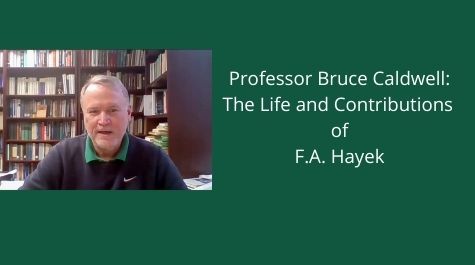Center for the Study of Law and Markets Hosts Lecture by Bruce Caldwell on F.A. Hayek
On February 10, the Center for the Study of Law and Markets hosted Professor Bruce Caldwell, a prominent economic historian at Duke University. Caldwell, who directs Duke’s Center for the History of Political Economy, delivered a lecture entitled: “ The Life and Contributions of F.A. Hayek.” The lecture was made possible by the generosity of alumni and other private support.
Caldwell earned his undergraduate degree from William & Mary and his Ph.D in Economics from the University of North Carolina at Chapel Hill. He is the author of several books and over two hundred articles and essays on a variety of topics, including Economic History and the Methodology of Economic Science. He is the world’s leading authority on the life and ideas of Hayek (1899-1992), who shared the 1974 Nobel Prize in Economic Science. He is the author of “Hayek's Challenge: An Intellectual Biography of F. A. Hayek” and has served as the general editor of the book series “The Collected Works of F.A. Hayek” since 2002. Caldwell is currently working on a family authorized biography of Hayek. Publication of volume one (with co-author Hansjoerg Klausinger) is expected in 2021.
Caldwell “got interested in Hayek because his was a twentieth-century life.” He traced the trajectory of Hayek’s life: his birth in Vienna to an intellectually prominent family, his education in law and economics at the University of Vienna, and a professional life that took him to New York, London, Cambridge, Chicago and, in later years, to Salzburg and Freiburg. Caldwell opined that Hayek’s life provides a remarkable window into the development of economic thought in the era. “He managed to be in the right place at the right time in terms of his interaction with lots of other famous or influential economists in the twentieth century,” said Caldwell. Often, he added, Hayek vigorously disagreed with them.
Caldwell also canvassed Hayek’s ideas in areas such as monetary theory, economic methodology and the organization of economic systems. He also explored what Hayek deemed “the knowledge problem,” its relation to his critique of socialism and central planning as well as Hayek’s overall defense of liberalism.
Caldwell concluded with a discussion of two of Hayek’s books. “If ‘The Road to Serfdom’ is a critique of the worst nightmare scenario that you can get in a totalitarian socialist system, ‘The Constitution of Liberty’ is [Hayek’s] attempt to offer an answer to the question of what such a liberal utopia would look like,” he said.
The lecture was held on Zoom and the audience included the Center’s faculty and student fellows, as well as other members of the Law School and university community.
Listen to the podcast of the lecture.
About the Center for the Study of Law and Markets
The Center for the Study of Law and Markets at William & Mary Law School seeks to advance the understanding of the role of legal institutions in promoting well-functioning markets in a free society. Learn more.
About William & Mary Law School
Legal education in a university setting began at William & Mary in 1779. Now in its third century, America's first law school continues its historic mission of educating citizen lawyers who are prepared both to lead and to serve.
